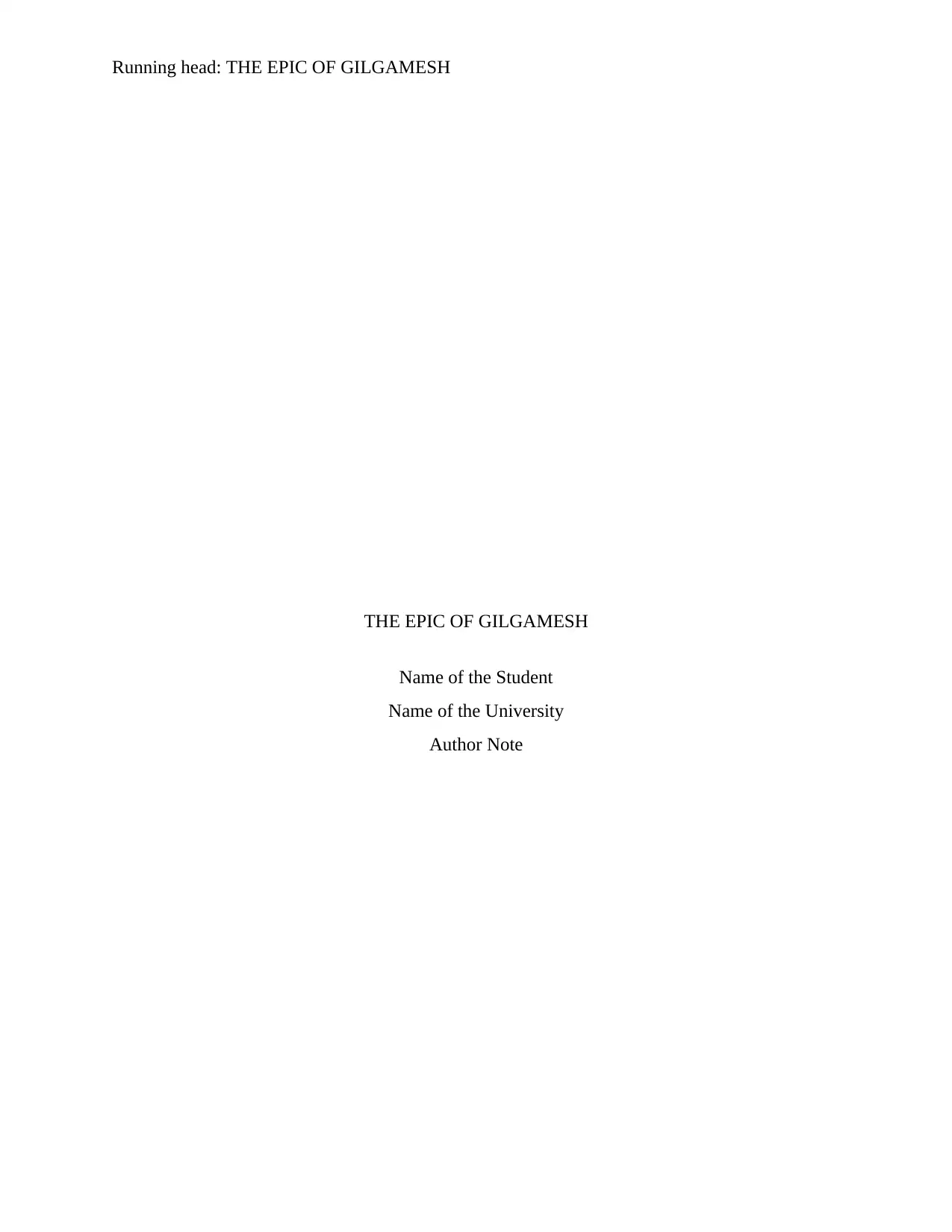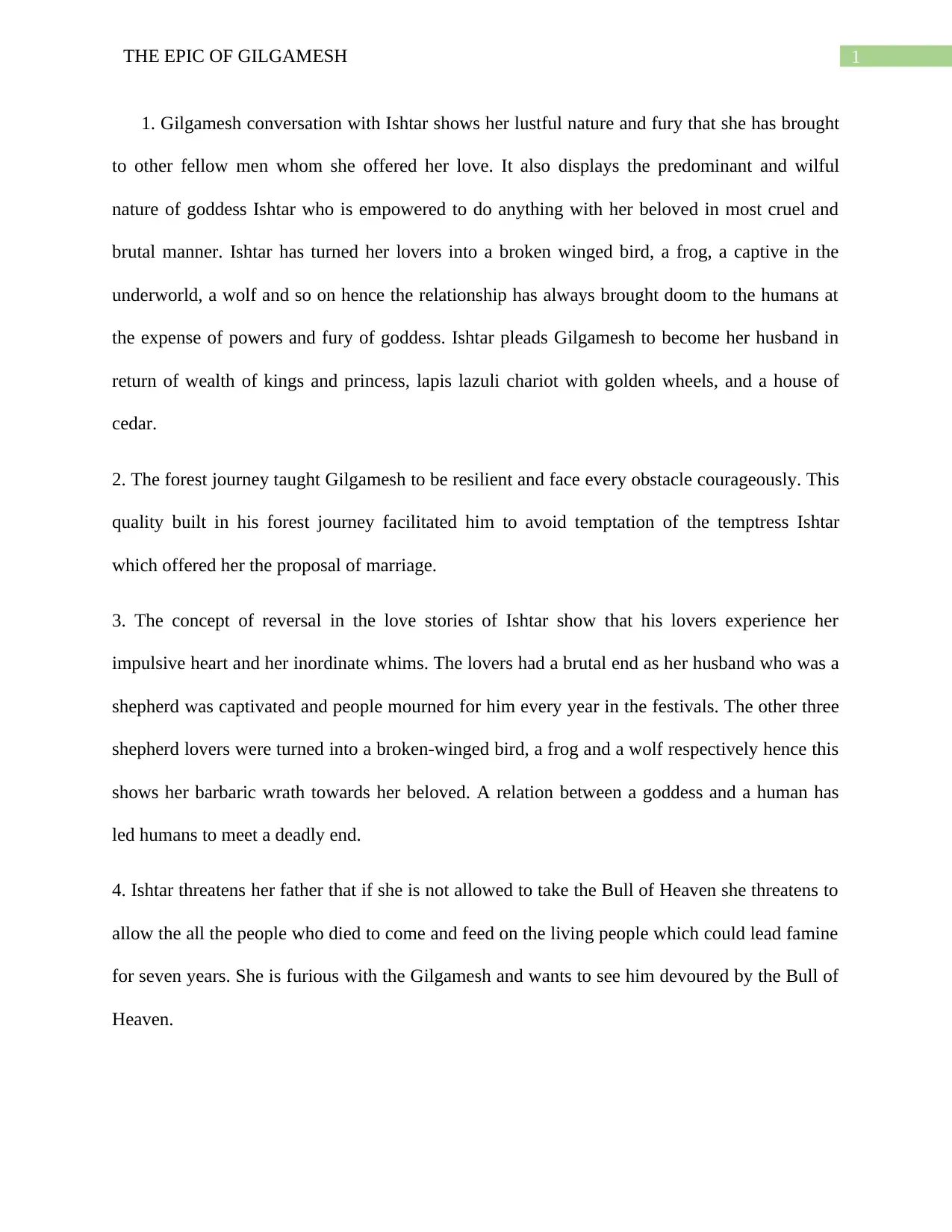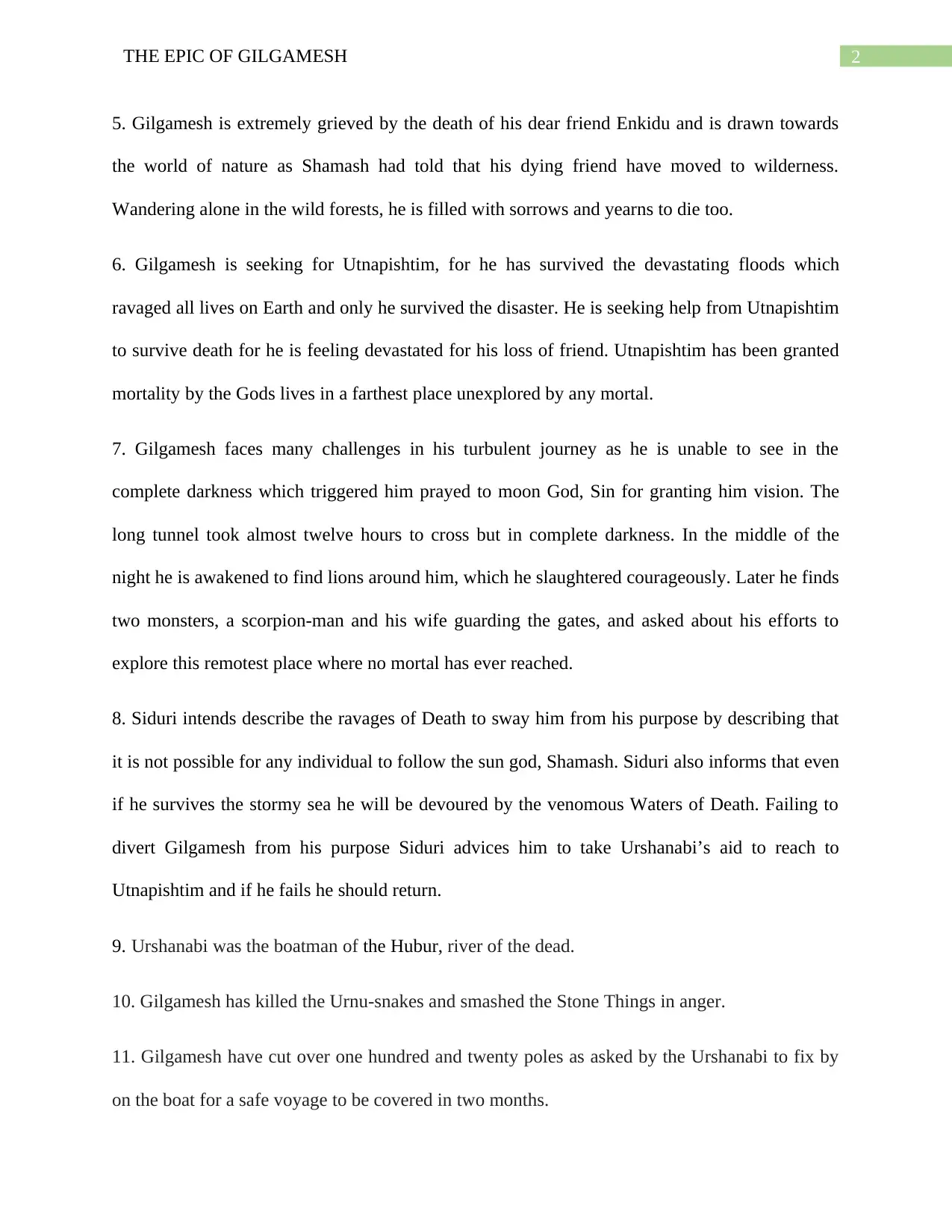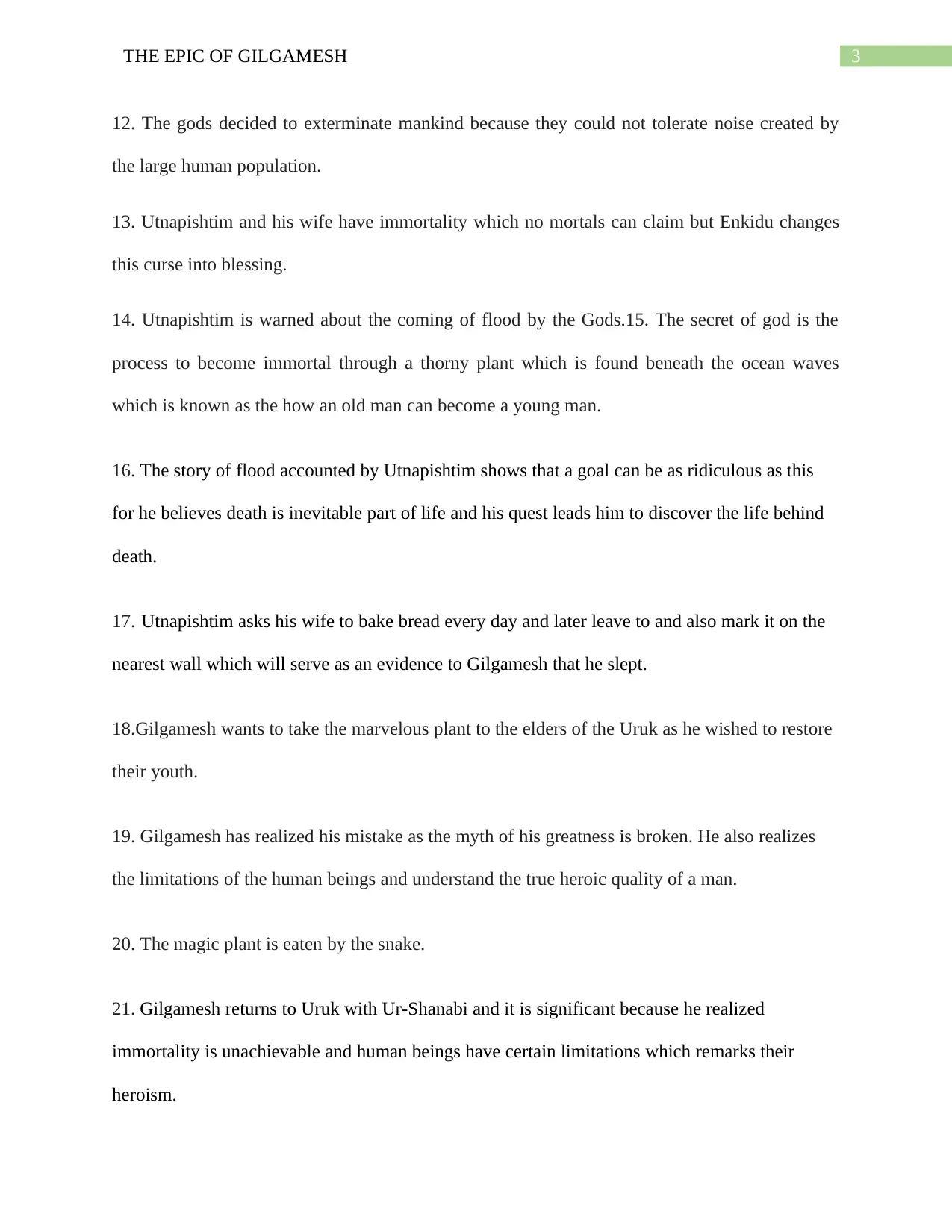In-Depth Analysis: Key Questions and Themes in Gilgamesh Epic
VerifiedAdded on 2023/06/03
|6
|1029
|242
Homework Assignment
AI Summary
This assignment provides detailed answers to questions about the Epic of Gilgamesh, exploring themes such as Gilgamesh's interactions with Ishtar, his forest journey, the concept of reversal in Ishtar's love stories, and her threat involving the Bull of Heaven. It further examines Gilgamesh's grief and quest for Utnapishtim, the challenges he faces, and Siduri's advice on death. The analysis covers Urshanabi, the gods' decision to exterminate mankind, Utnapishtim's immortality, and the secret of the gods. It concludes with Gilgamesh's return to Uruk, his realization of human limitations, and the significance of Uruk itself.

Running head: THE EPIC OF GILGAMESH
THE EPIC OF GILGAMESH
Name of the Student
Name of the University
Author Note
THE EPIC OF GILGAMESH
Name of the Student
Name of the University
Author Note
Paraphrase This Document
Need a fresh take? Get an instant paraphrase of this document with our AI Paraphraser

1THE EPIC OF GILGAMESH
1. Gilgamesh conversation with Ishtar shows her lustful nature and fury that she has brought
to other fellow men whom she offered her love. It also displays the predominant and wilful
nature of goddess Ishtar who is empowered to do anything with her beloved in most cruel and
brutal manner. Ishtar has turned her lovers into a broken winged bird, a frog, a captive in the
underworld, a wolf and so on hence the relationship has always brought doom to the humans at
the expense of powers and fury of goddess. Ishtar pleads Gilgamesh to become her husband in
return of wealth of kings and princess, lapis lazuli chariot with golden wheels, and a house of
cedar.
2. The forest journey taught Gilgamesh to be resilient and face every obstacle courageously. This
quality built in his forest journey facilitated him to avoid temptation of the temptress Ishtar
which offered her the proposal of marriage.
3. The concept of reversal in the love stories of Ishtar show that his lovers experience her
impulsive heart and her inordinate whims. The lovers had a brutal end as her husband who was a
shepherd was captivated and people mourned for him every year in the festivals. The other three
shepherd lovers were turned into a broken-winged bird, a frog and a wolf respectively hence this
shows her barbaric wrath towards her beloved. A relation between a goddess and a human has
led humans to meet a deadly end.
4. Ishtar threatens her father that if she is not allowed to take the Bull of Heaven she threatens to
allow the all the people who died to come and feed on the living people which could lead famine
for seven years. She is furious with the Gilgamesh and wants to see him devoured by the Bull of
Heaven.
1. Gilgamesh conversation with Ishtar shows her lustful nature and fury that she has brought
to other fellow men whom she offered her love. It also displays the predominant and wilful
nature of goddess Ishtar who is empowered to do anything with her beloved in most cruel and
brutal manner. Ishtar has turned her lovers into a broken winged bird, a frog, a captive in the
underworld, a wolf and so on hence the relationship has always brought doom to the humans at
the expense of powers and fury of goddess. Ishtar pleads Gilgamesh to become her husband in
return of wealth of kings and princess, lapis lazuli chariot with golden wheels, and a house of
cedar.
2. The forest journey taught Gilgamesh to be resilient and face every obstacle courageously. This
quality built in his forest journey facilitated him to avoid temptation of the temptress Ishtar
which offered her the proposal of marriage.
3. The concept of reversal in the love stories of Ishtar show that his lovers experience her
impulsive heart and her inordinate whims. The lovers had a brutal end as her husband who was a
shepherd was captivated and people mourned for him every year in the festivals. The other three
shepherd lovers were turned into a broken-winged bird, a frog and a wolf respectively hence this
shows her barbaric wrath towards her beloved. A relation between a goddess and a human has
led humans to meet a deadly end.
4. Ishtar threatens her father that if she is not allowed to take the Bull of Heaven she threatens to
allow the all the people who died to come and feed on the living people which could lead famine
for seven years. She is furious with the Gilgamesh and wants to see him devoured by the Bull of
Heaven.

2THE EPIC OF GILGAMESH
5. Gilgamesh is extremely grieved by the death of his dear friend Enkidu and is drawn towards
the world of nature as Shamash had told that his dying friend have moved to wilderness.
Wandering alone in the wild forests, he is filled with sorrows and yearns to die too.
6. Gilgamesh is seeking for Utnapishtim, for he has survived the devastating floods which
ravaged all lives on Earth and only he survived the disaster. He is seeking help from Utnapishtim
to survive death for he is feeling devastated for his loss of friend. Utnapishtim has been granted
mortality by the Gods lives in a farthest place unexplored by any mortal.
7. Gilgamesh faces many challenges in his turbulent journey as he is unable to see in the
complete darkness which triggered him prayed to moon God, Sin for granting him vision. The
long tunnel took almost twelve hours to cross but in complete darkness. In the middle of the
night he is awakened to find lions around him, which he slaughtered courageously. Later he finds
two monsters, a scorpion-man and his wife guarding the gates, and asked about his efforts to
explore this remotest place where no mortal has ever reached.
8. Siduri intends describe the ravages of Death to sway him from his purpose by describing that
it is not possible for any individual to follow the sun god, Shamash. Siduri also informs that even
if he survives the stormy sea he will be devoured by the venomous Waters of Death. Failing to
divert Gilgamesh from his purpose Siduri advices him to take Urshanabi’s aid to reach to
Utnapishtim and if he fails he should return.
9. Urshanabi was the boatman of the Hubur, river of the dead.
10. Gilgamesh has killed the Urnu-snakes and smashed the Stone Things in anger.
11. Gilgamesh have cut over one hundred and twenty poles as asked by the Urshanabi to fix by
on the boat for a safe voyage to be covered in two months.
5. Gilgamesh is extremely grieved by the death of his dear friend Enkidu and is drawn towards
the world of nature as Shamash had told that his dying friend have moved to wilderness.
Wandering alone in the wild forests, he is filled with sorrows and yearns to die too.
6. Gilgamesh is seeking for Utnapishtim, for he has survived the devastating floods which
ravaged all lives on Earth and only he survived the disaster. He is seeking help from Utnapishtim
to survive death for he is feeling devastated for his loss of friend. Utnapishtim has been granted
mortality by the Gods lives in a farthest place unexplored by any mortal.
7. Gilgamesh faces many challenges in his turbulent journey as he is unable to see in the
complete darkness which triggered him prayed to moon God, Sin for granting him vision. The
long tunnel took almost twelve hours to cross but in complete darkness. In the middle of the
night he is awakened to find lions around him, which he slaughtered courageously. Later he finds
two monsters, a scorpion-man and his wife guarding the gates, and asked about his efforts to
explore this remotest place where no mortal has ever reached.
8. Siduri intends describe the ravages of Death to sway him from his purpose by describing that
it is not possible for any individual to follow the sun god, Shamash. Siduri also informs that even
if he survives the stormy sea he will be devoured by the venomous Waters of Death. Failing to
divert Gilgamesh from his purpose Siduri advices him to take Urshanabi’s aid to reach to
Utnapishtim and if he fails he should return.
9. Urshanabi was the boatman of the Hubur, river of the dead.
10. Gilgamesh has killed the Urnu-snakes and smashed the Stone Things in anger.
11. Gilgamesh have cut over one hundred and twenty poles as asked by the Urshanabi to fix by
on the boat for a safe voyage to be covered in two months.
⊘ This is a preview!⊘
Do you want full access?
Subscribe today to unlock all pages.

Trusted by 1+ million students worldwide

3THE EPIC OF GILGAMESH
12. The gods decided to exterminate mankind because they could not tolerate noise created by
the large human population.
13. Utnapishtim and his wife have immortality which no mortals can claim but Enkidu changes
this curse into blessing.
14. Utnapishtim is warned about the coming of flood by the Gods.15. The secret of god is the
process to become immortal through a thorny plant which is found beneath the ocean waves
which is known as the how an old man can become a young man.
16. The story of flood accounted by Utnapishtim shows that a goal can be as ridiculous as this
for he believes death is inevitable part of life and his quest leads him to discover the life behind
death.
17. Utnapishtim asks his wife to bake bread every day and later leave to and also mark it on the
nearest wall which will serve as an evidence to Gilgamesh that he slept.
18.Gilgamesh wants to take the marvelous plant to the elders of the Uruk as he wished to restore
their youth.
19. Gilgamesh has realized his mistake as the myth of his greatness is broken. He also realizes
the limitations of the human beings and understand the true heroic quality of a man.
20. The magic plant is eaten by the snake.
21. Gilgamesh returns to Uruk with Ur-Shanabi and it is significant because he realized
immortality is unachievable and human beings have certain limitations which remarks their
heroism.
12. The gods decided to exterminate mankind because they could not tolerate noise created by
the large human population.
13. Utnapishtim and his wife have immortality which no mortals can claim but Enkidu changes
this curse into blessing.
14. Utnapishtim is warned about the coming of flood by the Gods.15. The secret of god is the
process to become immortal through a thorny plant which is found beneath the ocean waves
which is known as the how an old man can become a young man.
16. The story of flood accounted by Utnapishtim shows that a goal can be as ridiculous as this
for he believes death is inevitable part of life and his quest leads him to discover the life behind
death.
17. Utnapishtim asks his wife to bake bread every day and later leave to and also mark it on the
nearest wall which will serve as an evidence to Gilgamesh that he slept.
18.Gilgamesh wants to take the marvelous plant to the elders of the Uruk as he wished to restore
their youth.
19. Gilgamesh has realized his mistake as the myth of his greatness is broken. He also realizes
the limitations of the human beings and understand the true heroic quality of a man.
20. The magic plant is eaten by the snake.
21. Gilgamesh returns to Uruk with Ur-Shanabi and it is significant because he realized
immortality is unachievable and human beings have certain limitations which remarks their
heroism.
Paraphrase This Document
Need a fresh take? Get an instant paraphrase of this document with our AI Paraphraser

4THE EPIC OF GILGAMESH
22. The precinct of Uruk is significant for the great accomplishments achieved by the men as it
represents the immortality of the ancient era.
22. The precinct of Uruk is significant for the great accomplishments achieved by the men as it
represents the immortality of the ancient era.

5THE EPIC OF GILGAMESH
Reference
http://www.ancienttexts.org/library/mesopotamian/gilgamesh/tab1.htm
Reference
http://www.ancienttexts.org/library/mesopotamian/gilgamesh/tab1.htm
⊘ This is a preview!⊘
Do you want full access?
Subscribe today to unlock all pages.

Trusted by 1+ million students worldwide
1 out of 6
Your All-in-One AI-Powered Toolkit for Academic Success.
+13062052269
info@desklib.com
Available 24*7 on WhatsApp / Email
![[object Object]](/_next/static/media/star-bottom.7253800d.svg)
Unlock your academic potential
Copyright © 2020–2025 A2Z Services. All Rights Reserved. Developed and managed by ZUCOL.